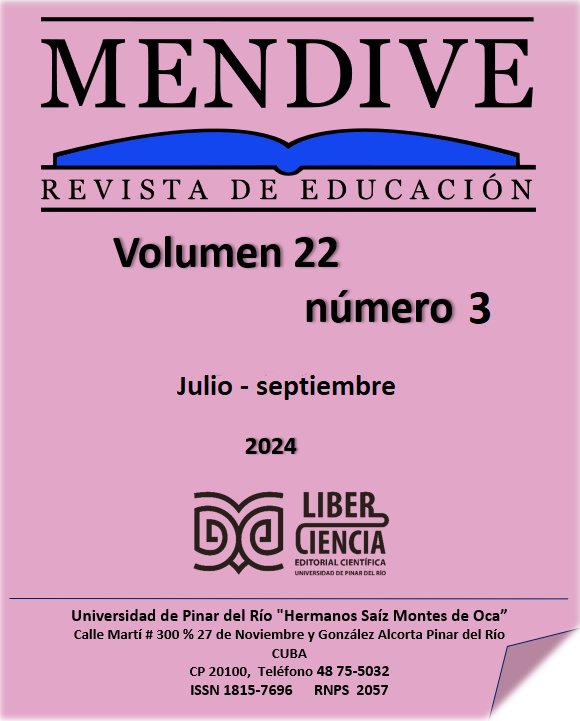Implementation of Genially as a strategy in the teaching-learning process of Natural Sciences
Main Article Content
Abstract
Digital tools are widely used in the educational field and make the student have a much more active role in education, as long as they are used creatively, due to the wide variety of ways in which technology can be introduced in the classroom. In this regard, the objective of this research was to propose a strategy for the implementation of the digital tool Genially in the teaching-learning process of Natural Sciences in Basic General Education of the Educational Unit "March 22", in the canton of San Lorenzo, province of Esmeraldas, Ecuador. A methodology with a mixed, descriptive approach was used. A field diagnosis was carried out at the educational center, together with a bibliographic research, in order to know the main problems that the students present. The results show that, according to the perception of the teachers and students surveyed, in the case of the former they do not have high digital skills, specifically in the skills, knowledge and experiences in using the interactive tool Genially. To this end, a strategy was created for the use of the aforementioned tool, which includes a training and education plan, based on the interpretation of the findings of the empirical study, for Natural Sciences teachers. It is concluded that the use of Genially in the teaching-learning process of Natural Sciences offers an innovative and dynamic approach that promotes the active participation of students. The proposed strategy highlights Genially's versatility to create engaging and personalized educational resources.
Downloads
Article Details

This work is licensed under a Creative Commons Attribution-NonCommercial 4.0 International License.
References
Acosta, D., Hernández, P., & Onofre, V. (2020). Habilidades sociales y su impacto en la educación del individuo. Revista de Investigación e Innovación Magazine De Las Ciencias., 5, 430-449.
Andrade, R., Carpio, R., & Sánchez, M. (2022). La educación mediada por las tecnologías durante la pandemia por COVID 19, desde la mirada de los estudiantes: aprendizajes y experiencias. Revista Científica de Ciencias Sociales y Humanas (80), 113 - 123. https://revistas.uazuay.edu.ec/flip/uverdad/080/uazuay-uverdad-080-07.pdf
Castro, D., & Ochoa, S. (2021). Gamificación en el proceso de interaprendizaje: Una experiencia en biología con Genially. CIENCIAMATRIA, 7(3), 249 - 272. https://www.cienciamatriarevista.org.ve/index.php/cm/article/view/579/874
Centeno, R., & Acuña, L. (2023). Competencias digitales docentes y formación continua: una propuesta desde el paradigma cualitativo. Revista Latinoamericana de Tecnología Educativa-RELATEC, 22(2), 119 - 137. https://relatec.unex.es/index.php/relatec/article/view/4722
Chaparro, C., Ramírez, J., Martínez, J., Ruiz, E., & Leiva, M. (2022). Pertinencia en el uso de las plataformas educativas prácticas de uso libre y su aplicación en el área de ciencias naturales en la educación media de instituciones educativas del sector oficial del departamento central. Ciencia Latina, 6(6), 12205-12219. https://ciencialatina.org/index.php/cienciala/article/view/4248/6515
Díaz, D., & Loyola, E. (2021). Competencias digitales en el contexto COVID 19: una mirada desde la educación. Revista Innova Educación, 3(1), 120 - 151.
Franco, J. (2021). La motivación docente para obtener calidad educativa en instituciones de educación superior. Revista Virtual Universidad Católica del Norte (64), 151 - 179. https://www.redalyc.org/journal/1942/194267200007/html/
Garzón, A., Segovia, J., & Mora, R. (2022). Estudio de la Brecha Digital y el Proceso de Enseñanza- Aprendizaje en Ecuador-Caso De Estudio: Universidad Técnica De Machala. Revista Angolana de Ciências, 4(2), 1 - 22. https://www.redalyc.org/journal/7041/704173402006/html/
Instituto Nacional de Formación Docente. (2020). Tutorial Genially. Argentina. https://red.infd.edu.ar/wp-content/uploads/2020/04/Tutorial-Genially.pdf
Logroño, L., Ramos, D., & Tello, D. (2023). Recursos digitales en la asignatura de ciencias naturales. Pentaciencias, 5(5), 228 - 244. https://www.editorialalema.org/index.php/pentaciencias/article/view/731/1019
Mejía, N., García, D., Erazo, J., & Narváez, C. (2020). Genially como estrategia para mejorar la comprensión lectora en educación básica. Cienciamatria revista, 7(1), 15. https://www.cienciamatriarevista.org.ve/index.php/cm/article/view/413
Rivas, H., & Alcívar, A. (2023). Uso de la plataforma Virtual Zoom como estrategia para mejorar el aprendizaje de las Ciencias Naturales. Revista científica MQR Investigar, 7(1), 10 - 20. https://www.investigarmqr.com/ojs/index.php/mqr/article/view/269
Simonelli, M. (2019). Integración de las TIC en las ciencias naturales para el desarrollo de las competencias: caso UPEL - IPMAR. Investigación y Postgrado, 34(2), 9-37.
Sunkel, G., Trucco, D., & Espejo, A. (2023). La integración de las tecnologías digitales en las escuelas de América Latina y el Caribe. Una mirada multidimensional (Primera Edición ed.). CEPAL-Naciones Unidas. https://repositorio.cepal.org/server/api/core/bitstreams/1430a3ff-1b88-4a49-a8e1-037f89bd77e6/content
Tomalá, M., Gallo, G., Mosquera, J., & Chancusig, J. (2020). Las plataformas virtuales para fomentar aprendizaje colaborativo en los estudiantes del bachillerato. Recimundo, 8, 199-212. https://www.recimundo.com/index.php/es/article/download/899/1622?inline=1


